Citroen C3 VS Mercedes Vito Bus – Specs, Efficiency & Price Comparison
Which model is the better choice – the Citroen C3 or the Mercedes Vito Bus? We compare performance (113 HP vs 237 HP), boot capacity (310 L vs 1390 L), efficiency (17.10 kWh5.50 L vs 26.70 kWh6.70 L), and of course, the price (13700 £ vs 36300 £).
Find out now which car fits your needs better!
The Citroen C3 (SUV) is powered by a Petrol, Electric or Petrol MHEV engine and comes with a Manuel or Automatic transmission. In comparison, the Mercedes Vito Bus (Bus) features a Diesel, Electric or Petrol engine and a Manuel or Automatic gearbox.
When it comes to boot capacity, the Citroen C3 offers 310 L, while the Mercedes Vito Bus provides 1390 L – depending on what matters most to you. If you’re looking for more power, you’ll need to decide whether the 113 HP of the Citroen C3 or the 237 HP of the Mercedes Vito Bus suits your needs better.
There are also differences in efficiency: 17.10 kWh5.50 L vs 26.70 kWh6.70 L. In terms of price, the Citroen C3 starts at 13700 £, while the Mercedes Vito Bus is available from 36300 £.
Compare all the key specs now and find out which model fits your lifestyle best!
Citroen C3
The Citroën C3 exudes a quirky charm with its distinctive design and bold colour options, making it stand out in the crowded hatchback market. Its interior is crafted with comfort in mind, offering plush seating and a host of modern technology features to enhance the driving experience. The C3's compact size makes it an ideal choice for urban commuting, effortlessly navigating through city streets while maintaining a sense of style and practicality.
details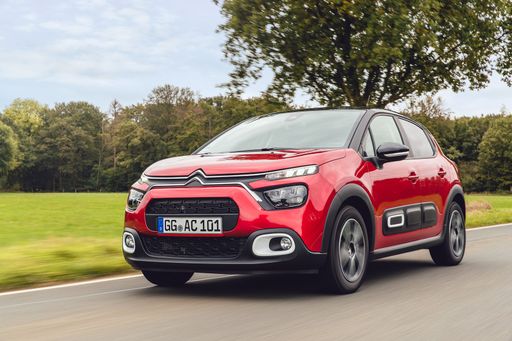 @ media.stellantis.com
@ media.stellantis.com
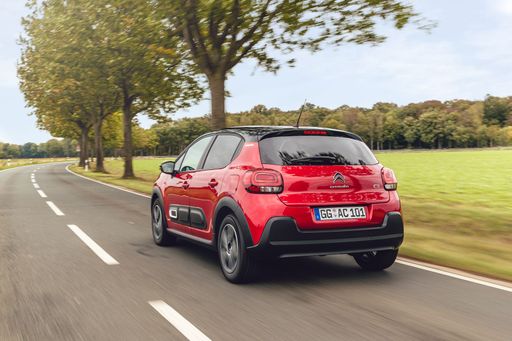 @ media.stellantis.com
@ media.stellantis.com
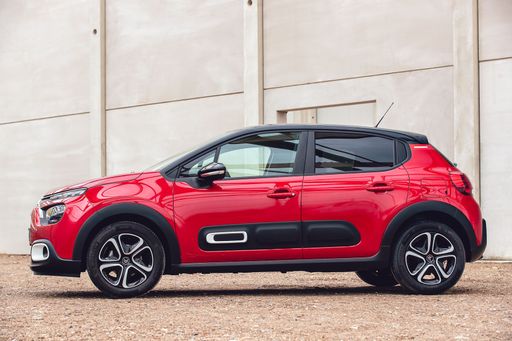 @ media.stellantis.com
@ media.stellantis.com
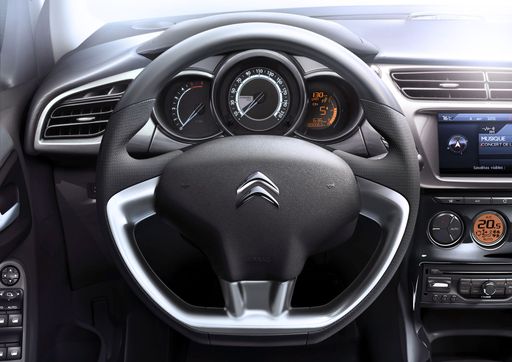 @ media.stellantis.com
@ media.stellantis.com
Mercedes Vito Bus
The Mercedes-Benz Vito Bus offers a versatile solution for those in need of spacious and comfortable group transportation. Its refined interior is designed to enhance passenger comfort, making it ideal for both business and leisure travel. With a focus on safety and efficiency, it provides a reliable driving experience that aligns with the high standards expected of the Mercedes-Benz brand.
details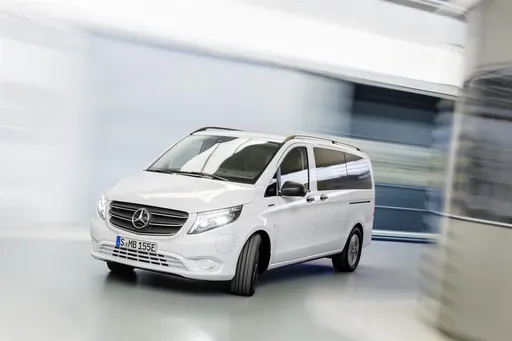

|

|
|
|
|
Costs and Consumption |
|
|---|---|
|
Price
13700 - 23800 £
|
Price
36300 - 59000 £
|
|
Consumption L/100km
5.5 - 5.6 L
|
Consumption L/100km
6.7 - 10 L
|
|
Consumption kWh/100km
17.1 - 17.4 kWh
|
Consumption kWh/100km
26.7 - 26.9 kWh
|
|
Electric Range
323 - 326 km
|
Electric Range
248 - 370 km
|
|
Battery Capacity
-
|
Battery Capacity
60 - 90 kWh
|
|
co2
0 - 126 g/km
|
co2
0 - 228 g/km
|
|
Fuel tank capacity
44 L
|
Fuel tank capacity
57 - 70 L
|
Dimensions and Body |
|
|---|---|
|
Body Type
SUV
|
Body Type
Bus
|
|
Seats
2 - 5
|
Seats
8
|
|
Doors
5
|
Doors
4
|
|
Curb weight
1226 - 1518 kg
|
Curb weight
2023 - 2739 kg
|
|
Trunk capacity
310 L
|
Trunk capacity
580 - 1390 L
|
|
Length
4015 mm
|
Length
4895 - 5370 mm
|
|
Width
1755 mm
|
Width
1928 mm
|
|
Height
1567 mm
|
Height
1890 mm
|
|
Payload
227 - 491 kg
|
Payload
726 - 1077 kg
|
Engine and Performance |
|
|---|---|
|
Engine Type
Petrol, Electric, Petrol MHEV
|
Engine Type
Diesel, Electric, Petrol
|
|
Transmission
Manuel, Automatic
|
Transmission
Manuel, Automatic
|
|
Transmission Detail
Schaltgetriebe, Automat. Schaltgetriebe (Doppelkupplung)
|
Transmission Detail
Schaltgetriebe, Automatikgetriebe
|
|
Drive Type
Front-Wheel Drive
|
Drive Type
Rear-Wheel Drive, All-Wheel Drive, Front-Wheel Drive
|
|
Power HP
101 - 113 HP
|
Power HP
136 - 237 HP
|
|
Acceleration 0-100km/h
9.9 - 11 s
|
Acceleration 0-100km/h
-
|
|
Max Speed
132 - 183 km/h
|
Max Speed
140 km/h
|
|
Torque
120 - 205 Nm
|
Torque
330 - 500 Nm
|
|
Number of Cylinders
3
|
Number of Cylinders
4
|
|
Power kW
74 - 83 kW
|
Power kW
100 - 174 kW
|
|
Engine capacity
1199 cm3
|
Engine capacity
1950 - 1999 cm3
|
General |
|
|---|---|
|
Model Year
2024 - 2025
|
Model Year
2024
|
|
CO2 Efficiency Class
D, A
|
CO2 Efficiency Class
G, A
|
|
Brand
Citroen
|
Brand
Mercedes-Benz
|
Citroen C3
Introduction to the Citroen C3
The Citroen C3 has long been a staple in the compact SUV segment, combining style, efficiency, and innovation. The latest iteration holds to this tradition while incorporating advancements that truly set it apart from its competitors. In this article, we delve into the technical details and explore the innovations that make the Citroen C3 an appealing choice for modern drivers.
Efficiency Meets Performance
The Citroen C3 offers a range of powertrains tailored to meet diverse customer needs. With petrol and electric options available, the C3 provides either a sleek manual or a responsive automatic gearbox. The petrol variant, powered by a three-cylinder engine, delivers an impressive output of 101 PS, achieving a consumption rate of just 5.6 L/100km. On the other hand, the fully electric e-C3 provides an output of 113 PS and an outstanding efficiency of between 17.1 and 17.4 kWh/100km, with a maximum electric range stretching from 320 to 326 km.
Design and Comfort
Citreon's focus on comfort is evident in the C3's spacious interior design, which accommodates five passengers. The SUV's dimensions — 4,015 mm in length, 1,755 mm in width, and 1,567 mm in height — combine in a way that gives ample room without compromising manoeuvrability. Furthermore, the Citroen C3 boasts a 310-litre boot, ensuring plenty of space for travel luggage or shopping.
Driving Dynamics and Safety
Front-wheel drive and a choice of manual or automatic gearboxes ensure a smooth and adaptable driving experience. The C3 offers a range of advanced safety features and driver assistance systems, cementing its reputation as a car that prioritises the safety of its passengers. Whether navigating city streets or cruising the open road, the Citroen C3's robust design provides assurance to all on board.
Technologically Advanced
Inside, the Citroen C3 presents a suite of modern technologies that enhance every journey. The vehicle's infotainment system is intuitive and easy to operate, featuring integration with smartphones to keep drivers connected. The built-in efficiency monitoring systems also provide real-time feedback, empowering drivers to maintain optimal energy conservation.
The Final Verdict
From its efficient engines to its innovative in-car technology and comfort-driven design, the Citroen C3 stands as an embodiment of modern automotive evolution. With prices starting from €14,990 and reaching up to €27,800, it offers competitive value and versatility for various budgets. In the 2024 model year, the Citroen C3 continues to inspire with its blend of economy, performance, and distinctive style, truly appealing to the demands of today's drivers.
Mercedes Vito Bus
The Mercedes Vito Bus: A Comprehensive Look at Innovation and Performance
In the automotive world, the Mercedes Vito Bus stands out as a versatile and reliable choice for those in need of a spacious and efficient mode of transport. With a reputation for engineering excellence, Mercedes-Benz has once again delivered with the latest versions of the Vito Bus. This article delves into the technical aspects, innovations, and what makes the Vito Bus a prime option in its segment.
Engine Power and Efficiency
The Mercedes Vito Bus offers a remarkable range of engine configurations, catering to both diesel and electric powertrains. The diesel models come with options ranging from 136 HP to a powerful 237 HP. The robust four-cylinder diesel engines are designed for efficiency, offering a range of fuel consumption figures from 6.7 L to 7.8 L per 100 kilometers, depending on the variant. Meanwhile, the electric eVito Tourer provides an impressive alternative with a power output of 204 HP and offers ranges of up to 371 kilometers on a single charge, making it a frontrunner in sustainable transportation solutions.
Transmission and Drivetrain Options
The Vito Bus is equipped with both manual and automatic transmission options, ensuring a drive tailored to user preferences. The 9G-TRONIC automatic gearbox is notable for its smooth transitions, enhancing the driving experience. Customers can choose between rear-wheel drive and the adaptable all-wheel drive system. The introduction of the eVito Tourer's front-wheel drive system further expands the versatility of the lineup, offering an electric alternative for urban and rural environments alike.
Interior Comfort and Practicality
The interior of the Vito Bus is designed with comfort and convenience in mind. Capable of seating up to eight passengers, the spacious cabin is ideal for family travel or business transportation. The Vito Bus offers three body lengths—kompakt, lang, and extralang—providing flexibility to accommodate different passenger and cargo requirements. The well-thought-out design ensures ample storage with trunk capacities ranging up to 1,390 liters in certain configurations.
Advanced Innovations
Mercedes-Benz has equipped the Vito Bus with a host of advanced technological features. The focus on safety is evident, with systems like Crosswind Assist and Attention Assist, ensuring greater control and alertness on the road. The eVito Tourer comes with the latest in electric vehicle technology, including efficient battery management systems that optimize range and performance.
Performance and Dynamics
The Vito Bus showcases impressive performance metrics across its variants. With a maximum torque ranging from 330 Nm to 500 Nm, the Vito Bus ensures a responsive and agile driving experience. The consistent build quality and dynamic chassis contribute to a pleasing ride, whether navigating city streets or cruising on the highway.
Conclusion
The Mercedes Vito Bus continues to be a leading choice for those looking for a reliable and performance-oriented vehicle. With its diverse range of engine options, innovative features, and versatile configurations, the Vito Bus meets the demands of both personal and professional transportation. The introduction of electric variants highlights Mercedes-Benz's commitment to sustainability without compromising on power or range. As the automotive industry continues to evolve, the Vito Bus exemplifies the blend of traditional excellence and forward-thinking innovation.
The prices and data displayed are estimates based on German list prices and may vary by country. This information is not legally binding.
